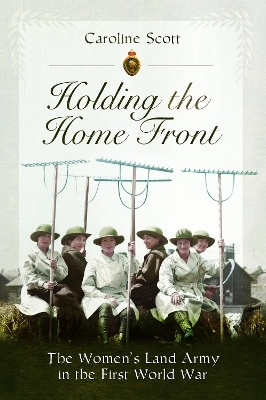
Holding the Home Front
The Women's Land Army in The First World War
Seiten
2020
Pen & Sword History (Verlag)
978-1-5267-8149-9 (ISBN)
Pen & Sword History (Verlag)
978-1-5267-8149-9 (ISBN)
Uses previously unpublished diaries and accounts. so that the womens voices take the lead in telling their story. Previously unpublished photographs and long-forgotten cartoons and poems, penned by the women themselves, giving an engaging immediacy and a real sense of who these women were.
In recent years the Second World War's land girl has caught the public imagination. Weve seen her in films, television series and novels. We might be misremembering her, we might have distorted her image into one that suits a twenty-first century audience, but we haven't forgotten. Other things have been forgotten, though. One could be forgiven for supposing that the story of the Women's Land Army starts in 1939/. But its a much older and more complicated history.
British agricultural policy during the First World War was held up as a success story; coming through a great national emergency, domestic food production was higher at the end of the war than at the start, the average calorific value of the British diet barely changed and bread never had to be rationed here. As the press reported starvation and food riots overseas, the 1918 harvest was held up as one of the great achievements of the War.
In 1917, at the darkest hour, when Britain's food security looked most precarious, it was said that, If it were not for the women agriculture would be absolutely at a standstill on many farms. Is that true? Were women really keeping the wheels turning? Using previously unpublished accounts and photographs, this book is an attempt to understand how the return of women to the fields and farmyards impacted agriculture - and, in turn, an examination of how that experience affected them.
This is the story of the First World War's forgotten land army.
In recent years the Second World War's land girl has caught the public imagination. Weve seen her in films, television series and novels. We might be misremembering her, we might have distorted her image into one that suits a twenty-first century audience, but we haven't forgotten. Other things have been forgotten, though. One could be forgiven for supposing that the story of the Women's Land Army starts in 1939/. But its a much older and more complicated history.
British agricultural policy during the First World War was held up as a success story; coming through a great national emergency, domestic food production was higher at the end of the war than at the start, the average calorific value of the British diet barely changed and bread never had to be rationed here. As the press reported starvation and food riots overseas, the 1918 harvest was held up as one of the great achievements of the War.
In 1917, at the darkest hour, when Britain's food security looked most precarious, it was said that, If it were not for the women agriculture would be absolutely at a standstill on many farms. Is that true? Were women really keeping the wheels turning? Using previously unpublished accounts and photographs, this book is an attempt to understand how the return of women to the fields and farmyards impacted agriculture - and, in turn, an examination of how that experience affected them.
This is the story of the First World War's forgotten land army.
After completing her Ph.D in History at Durham, Caroline Scott joined an investment banks graduate training scheme and spent two years working in the City. Since then she has worked as a market analyst for a diamond trading company, in London, Belgium and latterly France. In her spare time she continues to enjoy historical research. She has transcribed battalion War Diaries and works as a transcription volunteer for the National Maritime Museum (1915 Crew List Index Project).
| Erscheinungsdatum | 13.08.2020 |
|---|---|
| Zusatzinfo | 32 black and white illustrations |
| Verlagsort | Barnsley |
| Sprache | englisch |
| Maße | 156 x 234 mm |
| Themenwelt | Geschichte ► Allgemeine Geschichte ► Neuzeit (bis 1918) |
| Geisteswissenschaften ► Geschichte ► Regional- / Ländergeschichte | |
| Sozialwissenschaften ► Soziologie ► Gender Studies | |
| ISBN-10 | 1-5267-8149-2 / 1526781492 |
| ISBN-13 | 978-1-5267-8149-9 / 9781526781499 |
| Zustand | Neuware |
| Haben Sie eine Frage zum Produkt? |
Mehr entdecken
aus dem Bereich
aus dem Bereich
Europa 1848/49 und der Kampf für eine neue Welt
Buch | Hardcover (2023)
DVA (Verlag)
CHF 67,20
Giordano Bruno - ein ketzerisches Leben
Buch | Hardcover (2024)
C.H.Beck (Verlag)
CHF 41,85


